Due to the poor quality of available food grains on the market, many people suffer from various health conditions. To avoid such risks, you should divert to our traditional roots, i.e., ancient grains in a healthy cereal NYT.
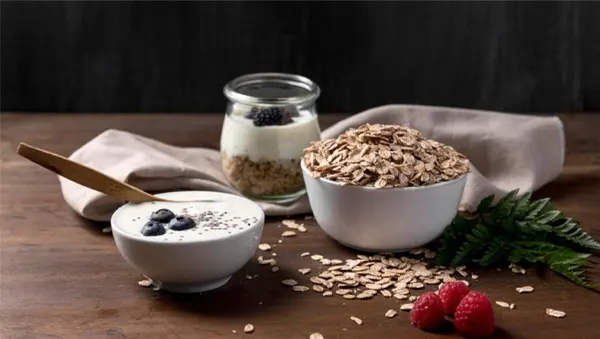
These nutrient-dense options are full of vitamins, fiber, antioxidants, and other minerals. Using these grains, you can make several of the best food cuisines with a delicious taste to kickstart your day in the best possible way.
Further, let’s get to know what makes these ancient grains so popular among healthy eaters by exploring their varieties, benefits, cuisine ideas, and much more.
Ancient grains are those varieties of grains that have grown over the last hundred years and have not lost their original form due to evolution or agricultural innovation. They are not genetically modified for higher yields and hence still hold a large amount of nutrients along with their original form and texture.
These grains were staple foods for ancient people and have recently regained popularity in the health food industry. This has been possible due to their wide array of unmatchable benefits, including:
Modern grains might be difficult to digest for people of all age groups, but that’s not the case with ancient grains. This is also making them a great choice for those who are gluten-sensitive or have digestive issues.
Ancient grains are filled with various nutrients, including vitamins, minerals, and essential amino acids. These contents contribute to different health benefits, making them a great addition to vegetarian and vegan diets.
The old grains protect our bodies from oxidative stress and inflammation due to the presence of antioxidants in them. Polyphenols and flavonoids are two of them that provide long-term health benefits if consumed regularly.
They are used as staples in various traditional dishes as well as culinary applications such as soups, salads, cereals, and baked goods.
In this way, ancient grains in a healthy cereal NYT bring diversity to our plates along with both taste and nutrition, making them an ideal choice among health-conscious eaters.
There are several varieties of ancient wheat and grains available in the market, which are rich sources of nutrition. Some of the most popular and highly consumed grains among them are discussed below, along with their nutritional content:
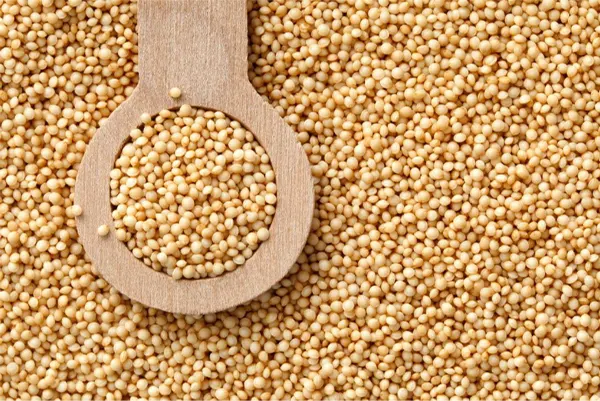
It is a gluten-free grain with high protein, fiber, iron, magnesium, and other micronutrients. Amaranth can be used in various cuisines to give them a nutty flavor.
| Grain | Protein (g) | Fiber (g) | Iron (mg) | Gluten-Free | Calories (per 100g) |
| Amaranth | 4.7 | 2.6 | 2.6 | Yes | 125.5 |
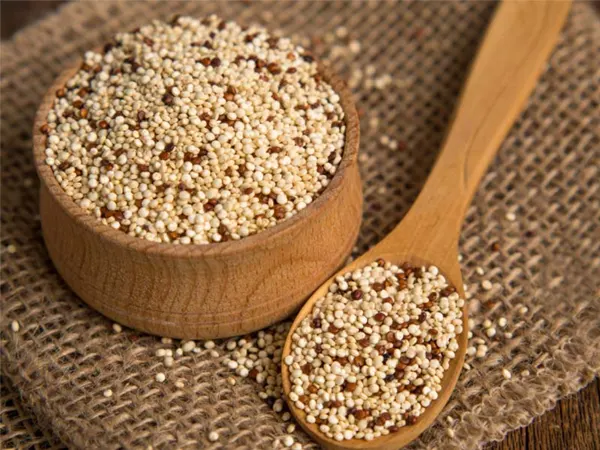
This cereal is a full-fledged source of protein, containing all nine essential amino acids. Quinoa is also gluten-free, making it a great choice to add to your meal.
| Grain | Protein (g) | Fiber (g) | Iron (mg) | Gluten-Free | Calories (per 100g) |
| Quinoa | 8 | 5 | 2.8 | Yes | 120 |
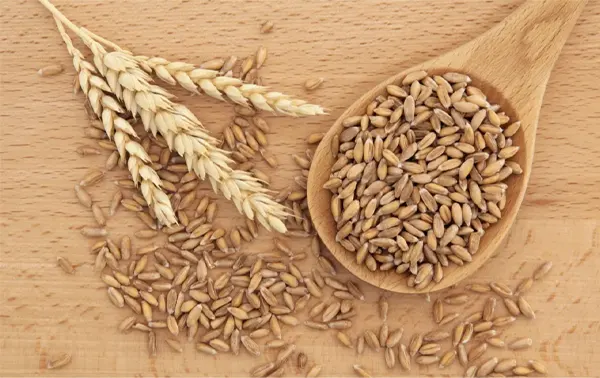
An easy-to-digest wheat variety, spelt is high in fiber and protein and has a sweet and nutty taste.
| Grain | Protein (g) | Fiber (g) | Iron (mg) | Gluten-Free | Calories (per 100g) |
| Spelt | 7 | 4 | 3.0 | No | 340 |
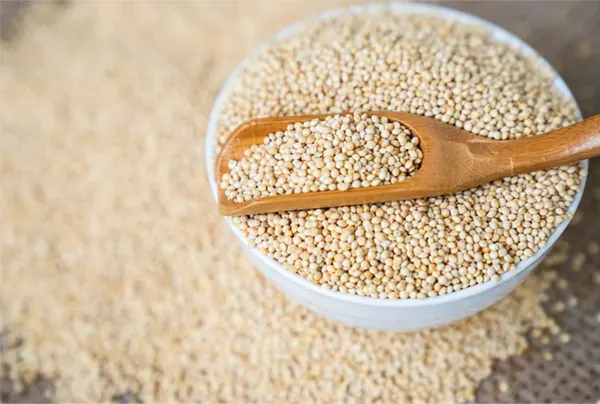
Millet is a small grain used in both sweet and savory diets. This gluten-free grain is rich in magnesium, manganese, and phosphorus.
| Grain | Protein (g) | Fiber (g) | Iron (mg) | Gluten-Free | Calories (per 100g) |
| Millet | 6 | 2 | 1.1 | Yes | 119 |
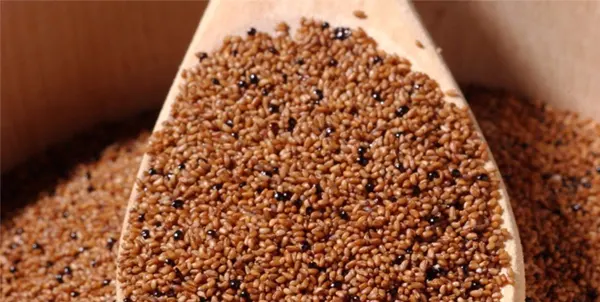
A tiny grain filled with iron, fiber, magnesium, and calcium with a low glycemic index. It has been used in Ethiopian cuisine for thousands of years.
| Grain | Protein (g) | Fiber (g) | Iron (mg) | Gluten-Free | Calories (per 100g) |
| Teff | 10 | 6 | 7.5 | Yes | 367 |
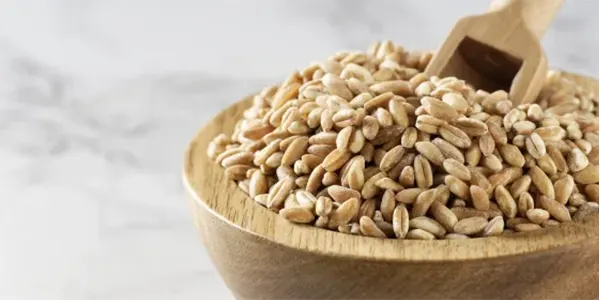
Farro is another ancient variety of wheat that contains a good amount of protein and fiber. It has a chewy texture and nutty flavor and can be used in soups, salads, and other dishes.
| Grain | Protein (g) | Fiber (g) | Iron (mg) | Gluten-Free | Calories (per 100g) |
| Farro | 6 | 5 | 1.8 | No | 340 |
Some other varieties of ancient grains include Khorasan wheat (Kamut), Sorghum, Freekeh, Barley, Bulgur, Rye, Fonio, etc.
The most common myth surrounding healthy food is that it can’t be tasty. And to break that belief, here are some delicious food options that you can cook with the ancient grains to make your whole day energetic:
Make a healthy breakfast bowl filled with nutrients using cooked ancient grains like Quinoa or Millet as a base. Then, top with fruits, seeds, nuts, and nut butter for the delicious flavor.
You can combine cooked quinoa or Farro with Greek yogurt along with your favorite fruits and add some toppings of honey and nuts.
If you love smoothies, you can add a scoop of cooked Teff or mullet to it and blend it with fruits and greens to make it a complete pack of nutrients.
Prepare a hot cereal by cooking Quinoa or Farro in milk or water and topping it with all your favorite fruits, nuts, and spices to have a perfect breakfast.
You can use Spelt or Ferro in your pancake or muffin to add flavor and texture along with nutritional benefits.
You can have homemade granola by baking quinoa, oats, and nuts with honey or maple syrup and enjoying a healthy snack.
Apart from this, you can combine these ancient grains with seeds, overnight-soaked oats, breakfast salads, and other food items to take a bowl filled with nutrients and enjoy various tasty gluten-free snacks and meals.
Today, a lot of people are suffering from different diseases, and the best way to prevent them is to keep your stomach healthy by consuming highly nutritious and protein-rich food. Ancient grains are the best option in this regard, as they prepare the body to fight against such diseases. Various health benefits that you may get from eating these grains are as follows:
Ancient grains with high fiber help to control cholesterol levels and support cardiovascular health, reducing the risk of heart disease and heart failure.
Fiber in these grains also helps in regular bowel movements and promotes digestive health. As a prebiotic, it also supports good gut bacteria.
Protein and fiber, together, provide a balanced diet and aid in weight management. They also prevent spikes in blood sugar levels by gradually releasing energy into the body.
Bone Health
Having calcium and magnesium in ancient grain diets builds healthy bones and prevents osteoporosis.
The antioxidants make the body strong against oxidative stress and inflammation, thus promoting overall health.
Consuming vitamins and minerals through ancient grains supports healthy skin, makes it shiny and scar-free, and improves appearance.
Additionally, ancient grains are also a great choice for the ecosystem as they give rise to agricultural diversity and sustainability.
Till now, we’ve got to know about all the health-related and other benefits of ancient grains in a healthy cereal NYT. But are they better than modern grains? Let’s get a clear picture of it through the following comparison table:
| Factor of Comparison | Ancient Grains | Modern Grains |
| Nutritional Profile | Rich in vitamins, minerals, and antioxidants. | Poor in nutrients due to selective breeding done to increase yield and pest resistance. |
| Health Benefits | Support various health benefits for the heart, digestive system, weight management, etc. | Have fewer health benefits due to a lack of nutrients and extreme use of chemical fertilizers instead of natural boosters. |
| Environmental Impact | Grow with fewer chemical inputs and are more resilient. | Often need more pesticides and fertilizers to grow and survive. |
| Sustainability | Promote biodiversity and sustainable farming. | Less sustainable due to monoculture practices. |
These ancient grains are not just limited to your plate but have been featured in the NYT crossword as well. Sounds odd? Read further and check yourself!
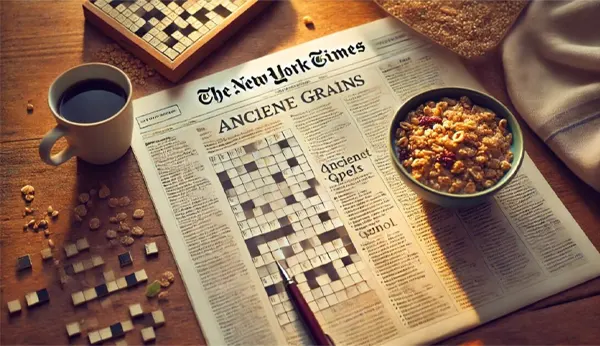
Puzzles related to ancient grains have often been seen in the New York Times Crossword with clues like “nutritious grain,” “superfood grain,” “grain used in ancient times,” or “ancient wheat variety.” This reflects their growing popularity in the present time. These featured clues also educate the solvers about these nutritious grains.
In order to solve these crosswords, you should initiate with easy clues and blanks to build a foundation. You need to remember four digits to memorize the NYT crossword by understanding the patterns and common prefixes or suffixes. Once filled in all the blanks, you can pick out the most relevant word from the Spelt, Millet, Ferro, Quinoa, Amaranth, Teff, etc. as the ancient grain in a healthy cereal, NYT’s answers.
As today’s generation is becoming more health conscious, the demand for ancient grains is expected to see a continuous rise in the upcoming years. With tech innovations in the food industry and advancements in sustainable farming practices and breeding techniques, the production of these grains can also be increased manyfold. This will support the availability and diversity of ancient grains in the market.
Also, due to higher supplies, the prices will go down, making it affordable for people to focus on their diet and health.
Ancient grains in a healthy cereal NYT are the powerhouse of energy and nutrients that help to avoid and fight against various health conditions. These pure-quality grains are loaded with vitamins, minerals, and fiber and also do not negatively impact the environment through poor means of farming. Now, various famous brands like Nature’s Path, Kashi, Bob’s Red Mill, and others are offering these grains at affordable prices.
So, if planning to start your fitness journey, don’t compromise with your food and its taste when you can have nutritious ancient food grains.
For a nutritious breakfast, you can try quinoa, millet, and amaranth to make oats, hot cereal, smoothies, granola, and other dishes.
To have a quick and healthy meal, you can make a quinoa salad, spelt flour pancake, or amaranth porridge.
Yes, these grains are safe and nutritious for kids. You can blend them with recipes like muffins, granola bars, and smoothies.
Ancient grains include several varieties of wheat like spelt, Khorasan wheat, einkorn, and emmer; the grains like millet, barley, and sorghum; and the pseudocereals quinoa, buckwheat, amaranth, and chia.
